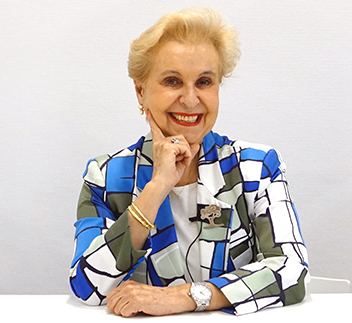SUSTAINABILITY| 07.02.2024
Gender equality, key for rural development
Carmen Quintanilla, National President of the Confederation of Federations and Associations of Rural Families and Women (AFAMMER) in Spain.
 Carmen Quintanilla, from Ciudad Real, Spain, is an honorary member of parliament and permanent member of the Council of Europe. She is a consultant and expert in policies on equality, rural development, and sustainability, with a longstanding career in civil service dedicated to agricultural cooperativism. AFAMMER currently benefits from Fundación MAPFRE’s support for the project “CuidaRural+: an opportunity for transformation”. This initiative trains caregivers in healthcare and socio-healthcare in Spain’s rural areas, fostering job creation and delivering quality care to rural populations in need.
Carmen Quintanilla, from Ciudad Real, Spain, is an honorary member of parliament and permanent member of the Council of Europe. She is a consultant and expert in policies on equality, rural development, and sustainability, with a longstanding career in civil service dedicated to agricultural cooperativism. AFAMMER currently benefits from Fundación MAPFRE’s support for the project “CuidaRural+: an opportunity for transformation”. This initiative trains caregivers in healthcare and socio-healthcare in Spain’s rural areas, fostering job creation and delivering quality care to rural populations in need.
What is your relationship with rural communities? What inspired you most to establish this association?
My relationship with rural life stems from my maternal grandparents, who frequently took us to my grandmother’s village, Brazatortas. There, we enjoyed the festivities, countryside, and traditions. My grandfather, a remarkably generous person, always extended a helping hand to others. His compassion has been a lifelong inspiration, motivating me to emulate his commitment to helping others.
I also had the privilege of pursuing education at a time when female university students were still uncommon. This education enabled me to realize my dream: founding the first association for rural families and women to achieve genuine equal opportunities in rural areas.. That was in 1982, at the height of Spain’s transition to democracy. As freedom was taking root, women sought a voice in the burgeoning democracy. Back then, the pervasive inequalities in our villages, particularly for rural women, were rarely acknowledged.
Forty-two years later, we’ve successfully brought women into the national and international political agendas and media spotlight. It hasn’t been easy, but we’ve succeeded.
What are the main challenges facing women in rural areas?
The main challenge lies in the inequality they experience, not just because they are women, but also due to living in rural areas marked by limited access to services.
For instance, in municipalities with fewer than 10,000 inhabitants, 35% of households have access to only one public service.
This lack of resources and services disproportionately affects rural women, leading to difficulties in achieving work-life balance and shared responsibilities. This issue significantly contributes to Spain having the second-highest rural female unemployment rate in the EU.
Despite rural women attaining higher levels of education, their job insecurity is exacerbated in rural settings. They often face higher rates of temporary and part-time employment compared to men. In Spain, 33% of young rural women have higher education, compared to 18.9% of men.
These inequalities also pose a serious threat to the future of agriculture and livestock farming. While the number of female farm managers has increased, with women now managing 3 out of every 10 agricultural operations, achieving gender parity in this sector remains a distant goal.
“The cornerstone of equality is employment”
What support does AFAMMER offer to women in rural areas?
AFAMMER provides various forms of support, including “customized training”, which assists women in venturing into diverse sectors of the rural economy such as agri-food, service industries, caregiving, and rural tourism. We also offer guidance on employment and entrepreneurship, host leadership workshops for rural women, and maintain a nationwide network connecting women throughout rural Spain.
Additionally, we offer specialized advisory services for rural women who are victims of or at risk of experiencing violence in rural environments.
When women in rural areas receive training and pursue entrepreneurial endeavors, they not only create opportunities for themselves but also generate wealth for their communities. Today, rural women account for more than half of self-employment in Spain.
I would encourage young women in these areas to persevere despite the challenges, as investing in work and entrepreneurship in rural areas can yield significant benefits. Their initiatives can foster up to a 300% increase in synergy across rural areas. These women are pivotal in breaking away from traditional masculinization and combating depopulation trends. By choosing to remain in villages, women contribute to community growth and development. The primary goal is to create more opportunities and employment for women, given their diverse skill sets ranging from psychologists to agricultural or industrial engineers, caregivers, and healthcare professionals. Addressing depopulation remains a critical challenge.
What would you highlight about your tenure as a member of parliament for the province of Ciudad Real? What about as Vice-President of the Council of Europe’s Committee on Equality and Non-Discrimination?
I never forgot that I entered politics to promote real equal opportunities for rural women. In 2003, thanks to an amendment I presented to the state’s general budget, I was able to launch a program to promote rural women.
During my time as a national member of parliament and as a member of the Spanish delegation to the Council of Europe, I had the opportunity to chair several committees. Among them, as you mentioned, I was Vice-President of the Council of Europe’s Committee on Equality and Non-Discrimination. At the national level, I chaired the Equality Committee and the Joint Committee for the Study of Drugs. I listened to many voices that came to me to implement social initiatives that have significantly impacted many lives.
Regarding my work at the Council of Europe, I gained many valuable insights. I had the opportunity to be speak before the Istanbul Convention, which for the first time recognized all forms of violence against women and domestic violence. I also prepared various reports, including Rural Women in Europe in 2011 and the report Equality and Integrity of Persons with Disabilities, among others.
“There will be no future for the people of the world without women”
Could you share a project led by women that significantly impacted rural development?
As national chairwoman of AFAMMER, I’ve had the opportunity to meet many women who, through hard work and dedication, have led remarkable projects. Special recognition goes to the women leading various AFAMMER delegations and those who have started their own businesses, achieving economic independence. Today, they make decisions about their own lives because they have jobs.
Throughout AFAMMER’s 42-year history, we have always believed that employment is the cornerstone of equality. From the beginning, we have implemented numerous projects to promote the employment and entrepreneurship of rural women.
There have been many projects of all different types, but to highlight a few, we supported a cooperative of women upholsterers in Bolaños de Calatrava and a cheese cooperative in Puebla de Don Rodrigo.
Today, 56% of rural accommodations in Spain are managed by women, many of whom received training from AFAMMER.
Our extensive customized training, with both in-person and online courses, has yielded great results. The pandemic accelerated our digital transition, catching many rural residents without the necessary knowledge to handle essential tasks like electronic signatures.
Fifteen years ago, we saw 80-year-old women learning to use email, surprising their grandchildren with their newfound skills. These experiences show that it is never too late to learn and create new opportunities.
Notably, our e-commerce course for rural businesses, developed in 2022 with support from Fundación MAPFRE, was very successful. And our Turisabor platform promotes local economies by facilitating the sale of local products from Protected Natural Spaces.
With this training, rural women entrepreneurs and female-run SMEs now sell their products online and compete with large multinational e-commerce platforms.
Last year, we highlighted 12 women entrepreneurs through our training program for green jobs and care jobs. These women serve as role models, inspiring others to follow their example.
What stories experienced within the AFAMMER association have impacted your life?
Over four decades, I’ve experienced countless wonderful and vibrant moments, and I’ve been fortunate to receive recognitions from major national and international organizations.
In 2018, I had the great honor of traveling to the United Nations and being named in the TOP 5 of the Committee of Distinction, which acknowledges the careers and efforts of women worldwide striving for true equal opportunities. I was the only European nominee, as this recognition is usually not given to women from developed countries.
In 2011, I received the National Award from the Observatory against Domestic and Gender Violence of the General Council of the Judiciary. This award was very meaningful to me because my sons, Antonio and Daniel, accompanied me. At that moment, I realized they understood the work I have done as the AFAMMER national chairwoman to achieve equal opportunities and fight gender violence.
I will also never forget the great solidarity network we rural women of AFAMMER created during the hardest moments of the pandemic. When we couldn’t go outside, we helped by making 500,000 masks, thanks to the collaboration of Genómica, which assisted us in obtaining funds that we distributed among AFAMMER women throughout Spain. We also stayed in constant contact with elderly women living alone during the pandemic, ensuring they had everything they needed so they wouldn’t have to go out and risk exposure to the virus. This solidarity network was recognized with the Solidarity Award from the European Economic and Social Committee in 2021.
This year, during our participation in the 68th Commission on the Status of Women at the United Nations, we signed our adherence to the Inter-American Decade for the Rights of All Women, Adolescents, and Girls in Rural Areas of the Americas (2024-2034), promoted by REDLAC. This initiative aims to guarantee the rights of rural women in international agreements such as CEDAW and the Beijing Declaration.
What impact do you think the AFAMMER and Fundación MAPFRE agreement can have?
Realizing genuine equal opportunities benefits everyone, not just in rural Spain. So, it’s important for prestigious companies like Fundación MAPFRE to partner with organizations such as AFAMMER, leveraging their grassroots experience to reach areas where government efforts may fall short.
AFAMMER’s project “CuidaRural+: an opportunity for transformation” aims to bolster employment training, strengthen community ties, and notably enhance quality of life in Spain’s rural regions.
Through this project, we provide rural residents with training opportunities, fostering job creation, and delivering high-quality care to underserved rural populations. This ensures more effective, compassionate, and tailored support to meet specific community needs.
Our goal is to improve healthcare and socio-healthcare training in Spain’s rural municipalities, particularly those with fewer than 30,000 residents.
To achieve this, we’re empowering non-professional caregivers in these areas, addressing the rising demand for care among vulnerable rural groups and promoting local community integration.
We’re also enhancing informal care for elderly, dependent, and disabled individuals within these communities, promoting health and well-being through disease prevention and encouraging healthy lifestyles in rural settings.
Our training program features 11 courses in the provinces of Almería, Granada, Badajoz, Murcia, Valencia, and Ciudad Real. The on-site courses include home healthcare and care for dependent individuals in social settings.
And we’re collaborating closely with municipalities, social services, community organizations, and key stakeholders to create employment opportunities for trained individuals within rural communities. This collaborative effort aims to enhance informal healthcare and socio-healthcare standards across the board.
RELATED ARTICLES:



